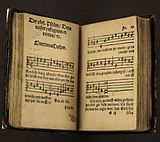- Chorale
-
This article is about the musical composition. For a singing group (sometimes called chorale), see choir.
A chorale was originally a hymn sung by a Christian congregation. In certain modern usage, this term may also include classical settings of such hymns and works of a similar character.
Chorales tend to have simple and singable tunes, because they were originally intended to be sung by the congregation rather than a professional choir. They generally have rhyming words and are in a strophic form (with the same melody being used for different verses). Within a verse, most chorales follow the AAB pattern of melody that is known as the German Bar form.
Martin Luther posited that worship should be conducted in German rather than Latin. He thus saw an immediate need for a large repertory of new chorales. He composed some chorale melodies himself, such as A Mighty Fortress. For other chorales he used Gregorian Chant melodies used in Catholic worship and fitted them with a new German text. A famous example is Christ lag in Todes Banden, which is based on the tune of the Catholic Easter Sequence Victimae Paschali Laudes.
Chorales were at first monophonic tunes (melody only). However, as early as 1524, Johann Walter published a book of these chorales arranged for four or five voice parts.
Today, many of the Lutheran chorales are familiar as hymns still used in Protestant churches, sung in four-voice harmony. Often the harmonizations are taken from the final movements of cantatas by Johann Sebastian Bach. The melodies of the chorales were only in a few instances composed by Bach; the large majority of melodies were already familiar to his congregation.
Chorale tunes also appear in chorale preludes, pieces generally for organ designed to be played immediately before the chorale in worship. A chorale prelude includes the melody of the chorale, and adds other contrapuntal lines. One of the first composers to write chorale preludes was Samuel Scheidt. Bach's many chorale preludes are the best-known examples of the form. Later composers of the chorale prelude include Johannes Brahms and Max Reger.
Derived from his understanding of musical settings of liturgy and Johann Sebastian Bach's chorale preludes, the symphonies, masses and motets of Anton Bruckner make frequent use of the chorale as a compositional device, often in contrast to and combination with the fugue.
Chorales have been the subject of many different musical treatments, most but not all from the German Baroque. See chorale setting for a description and a list of all the different types of musical setting and transformation that this important liturgical form has undergone.
References and further reading
- "Chorale", in The New Grove Dictionary of Music and Musicians, ed. Stanley Sadie. 20 vol. London, Macmillan Publishers Ltd., 1980. ISBN 1-56159-174-2
- The New Harvard Dictionary of Music, ed. Don Randel. Cambridge, Massachusetts, Harvard University Press, 1986. ISBN 0-674-61525-5
See also
External links
- Chorale at the Classical Music Pages
- Chorale discussion by Bernard Greenberg in the J. S. Bach FAQ (archived copy)
- Complete sets of all four-part Bach chorale settings in MIDI or QuickTime format
- American Choral Music, 1870-1923, LoC
- ChoraleGUIDE - help with Bach chorale harmonisation
Christian music Roots and Beginnings Genres and Subgenres Fusion genres Christian rock • Christian hardcore • Christian metal • Southern Gospel • Traditional black gospel • Christian alternative rock • Christian punk • Christian ska • Christian country music • Progressive Southern Gospel • Christian hip hop • Gospel blues • Urban contemporary gospelChant Lists Christian bands and artists by genre • Christian country artists • Christian dance, electronic, and techno artists • Christian folk/folk rock artists • Christian instrumental/jazz/swing artists • Christian metal bands • Christian punk bands • Christian vocal artists • Christian record labels • Gospel musiciansOther topics Categories:- Hymnology
- Lutheran liturgy and worship
- Christian music
Wikimedia Foundation. 2010.


